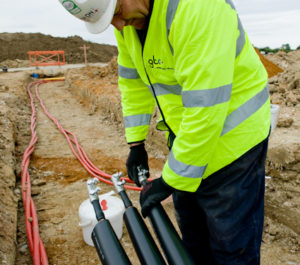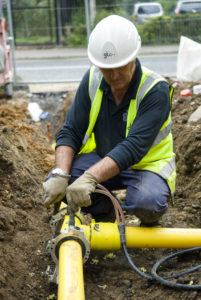
Tom Brough, Sales and Marketing GTC, investigates how the utilities market is changing and explores how developers can benefit from a more integrated approach.
Utilities are changing. Not only is the group of services referred to as utilities expanding, but at the same time the approach to installing and connecting them is changing too.
The term ‘Utilities’ used to refer to gas, electricity and water. More and more now, ultrafast fibre broadband is being viewed as the fourth essential utility. Developers of new-build properties are finding repeatedly that house purchasers look for and expect reliable, fast broadband in their new home. Indeed, Fibre-to-the-Home (FTTH) which delivers fibre, and with it ultrafast broadband, directly into each home has been developed to meet this growing demand.
 Whilst there are standards regarding the necessary provision of gas, electricity and water, and that each of these must be connected prior to the new homeowner moving in, the same is not true for fibre. Figures show that not only do new home buyers actively look at broadband provision before making a decision on a house, but they will actually decide against buying a house if it does not have a fast connection. They will even pay more for a home with reliable broadband.
Whilst there are standards regarding the necessary provision of gas, electricity and water, and that each of these must be connected prior to the new homeowner moving in, the same is not true for fibre. Figures show that not only do new home buyers actively look at broadband provision before making a decision on a house, but they will actually decide against buying a house if it does not have a fast connection. They will even pay more for a home with reliable broadband.
Fibre delivers the fastest broadband speeds and is future-proof. In today’s tech-savvy environment, housebuilders cannot afford to ignore fibre and the reassurance it offers customers.
Integrate water
There has been competition in the gas market for many years and GTC as a leading independent provider with national coverage, has worked hard within the industry, working with the regulator, to bring this same level of competition to the electricity markets.
In both the gas and electricity markets, independent companies are now able to compete on a level playing field. No longer do housebuilders talk about contacting the ‘gas board’ or the ‘electricity board’. They are well aware of the choices available and that they do not have to simply ‘make do’ with the incumbent provider.
Work now needs to be done to make this the case in the water market too, to develop increased competition which will drive service improvement and could also reduce costs for developers.
Joined-up thinking
A further change in the utilities market has been driven by the independent distribution network operators (IDNOs). Now able to carry out what is essentially the same role as the traditional operators, independents, like GTC, have brought healthy competition to the market.
Competing with the incumbents has brought improved levels of service to developers, offering flexibility, transparency, responsiveness and accountability – not to mention demonstrable cost savings. The latest developments of self-connection and the self-determination of points of connection mean that almost all of the work can be carried out by the one independent provider without the need to involve the incumbent. This has led to a more joined-up approach to how the independent can plan with the housebuilder and developer, the installation and connection of all the vital services.
Independent utilities companies, such as GTC, employ their own construction teams and, if they also offer the developer a multi-utility package, are able to install the whole utility infrastructure in one coordinated process, from quotation to connection.
Four in one
It is worthwhile, therefore, housebuilders considering all four utilities together. The economies of scale make it cost-effective to have all four installed and connected by a single provider. Considering FTTH upfront, along with the other standard utilities, also means that housebuilders can give customers another reason for choosing to buy from them, with the advantage of high-speed, highly reliable fibre broadband being available from day one.
GTC not only installs and connects the utilities but then goes on to own and operate the networks. This means that the housebuilder, developer and network operator have a common goal to connect safely all homes at the earliest opportunity. Connecting all utilities in one go means that the programme can be directly aligned to the housebuilder’s delivery schedule. The provision by the utilities company of a dedicated Project Manager ensures the smooth running of the process.
It is an approach that can work particularly effectively where large-scale housing developments are phased, and where planning for expansion can be an important cost factor. For example, on one project that our company was involved in, it was possible to lay additional ducting across the whole site to be developed, so that further substations could be added at a later date as required, without the need to dig up the roads laid for the initial tranche of housing.
Future-proofing
Fibre optics is perhaps the ultimate example of future-proofing. If fibre-optic cabling is laid right the way into each home (FTTH) then its capacity for download and upload speeds is almost infinite. This means that no matter how much technology progresses and how great our capacity needs become, the fibre-optic cabling laid today will be able to meet that demand.
Not so future-proof, however, are those fibre networks laid only as far as the nearest street cabinet. Fibre-to-the-Cabinet (FTTC), is a common solution offered and advertised by some of the big name telecoms companies. Whilst FTTC offers superfast speeds, the final length of copper cabling laid between the fibre-enabled cabinet and the home itself will always be restrictive in terms of speed and reliability. Hence, the much lower advertised speeds of this provision compared to FTTH.
Commercial packages available now mean that installing the latest high-speed fibre broadband will not cost the housebuilder a penny more than old-fashioned copper-cable options, enabling the housebuilder to offer their customers the most attractive solution without compromising return on investment.
Changing times
Utilities are changing and driving change in the marketplace. They have moved with the times and now include the most modern of technology, meeting the needs of households in allowing us all to work and socialise from home. The provision of utilities has changed too and GTC as an independent utilities company is now able to offer the full package of utilities, along with the service and delivery that housebuilders require.
In turn, housebuilders and developers are adapting their thinking to take into account the new demands of homeowners and the factors that now really matter to them. There are benefits in terms of speed, convenience and cost savings to developers of dealing with everything at once and this also delivers the benefits that house buyers are demanding.








